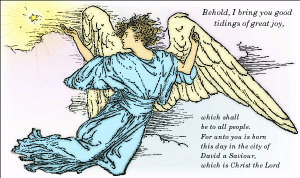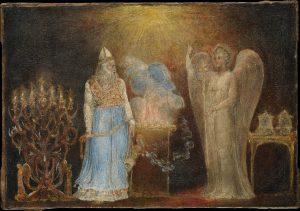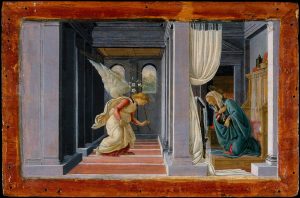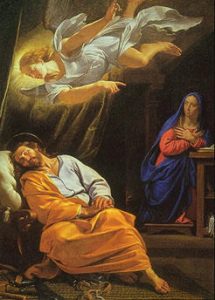
Since I finished my Thanksgiving posts for 2020 on Christmas Eve, I have not had time to think about a Christmas post. However, I believe I have found an excellent solution to get a message out in time for Christmas. I will revise and recycle a Christmas greeting that I actually wrote and published seven years ago. The theme of that post may be more appropriate today than when I first wrote it.

My message for Christmas 2020 is “Fear not!” Why would I choose “Fear not” as a Christmas greeting? Most Christmas greetings focus on other aspects of the angel’s message to the shepherds. Christmas cards are emblazoned with messages, such as “Peace,” “Joy,” “Good Will,” “The Savior has Come,” “Christ is born,” or “Christ is LORD.”
The authors of our favorite Christmas carols used these themes repeatedly. Interestingly many of these hymns originated in the 18th and 19th centuries. These hymns and carols of joy and peace were composed and first sung during times of severe social upheaval and discord. The world was in great need of words of peace and joy. Does this sound like the year 2020?
- While Shepherds Watched Their Flocks by Night (c1700) Lyrics by Nahum Tate, Poet Laureate of England, and music by George Kirbye
- Joy to the World, (1719) Lyrics by Isaac Watts and music by George Frederick Handel
- Silent Night (1818) German lyrics by Joseph Mohr and music by Franz Gruber, translated into English by Emily Elliott (1858)
- O Holy Night (1843) French lyrics by Placide Chapprau and music by Adolphe Adam, translated into English by John Sullivan Dwight (1855)
- It Came Upon a Midnight Clear (1849) Lyrics by Edward Sears and music by Richard Storrs Willis.
- Angels We Have Heard on High (1862) English translation of traditional French carol by Edward Shippen Barnes. Music is a traditional French song.
- O Little Town of Bethlehem (1868) Lyrics by Phillip Brooke and music by Lewis Redner

These hymns were also special because they are primarily based on the nativity story found in Luke’s Gospel.
And there were in the same country shepherds abiding in the field, keeping watch over their flock by night. And, lo, the angel of the Lord came upon them, and the glory of the Lord shone round about them: and they were sore afraid. And the angel said unto them, Fear not: for, behold, I bring you good tidings of great joy, which shall be to all people. For unto you is born this day in the city of David a Saviour, which is Christ the Lord. And this shall be a sign unto you; Ye shall find the babe wrapped in swaddling clothes, lying in a manger. And suddenly there was with the angel a multitude of the heavenly host praising God, and saying, Glory to God in the highest, and on earth peace, good will toward men.(Luke 2:8-14, KJV)
I selected the greeting, “Fear not!” because it may be the most used phrase in Matthew and Luke’s nativity narratives. In these passages, we find angels confronting people four times. All four times, some of the first words the angels speak are “Fear not!”

The first encounter chronologically is with Zacharias, a priest of Israel in the time of King Herod. Zacharias and his wife Elisabeth, cousin of Mary, were aging and without children even though they continually prayed for children. In Luke Chapter 1, we read the encounter between an angel and Zacharias as he was performing his rotational duty as the high priest:
There was in the days of Herod, the king of Judaea, a certain priest named Zacharias, of the course of Abia: and his wife was of the daughters of Aaron, and her name was Elisabeth. And they were both righteous before God, walking in all the commandments and ordinances of the Lord blameless. And they had no child, because that Elisabeth was barren, and they both were now well stricken in years. And it came to pass, that while he executed the priest’s office before God in the order of his course, according to the custom of the priest’s office, his lot was to burn incense when he went into the temple of the Lord. And the whole multitude of the people were praying without at the time of incense. And there appeared unto him an angel of the Lord standing on the right side of the altar of incense. And when Zacharias saw him, he was troubled, and fear fell upon him. But the angel said unto him, Fear not, Zacharias: for thy prayer is heard; and thy wife Elisabeth shall bear thee a son, and thou shalt call his name John. And thou shalt have joy and gladness; and many shall rejoice at his birth. For he shall be great in the sight of the Lord, and shall drink neither wine nor strong drink; and he shall be filled with the Holy Ghost, even from his mother’s womb. And many of the children of Israel shall he turn to the Lord their God. And he shall go before him in the spirit and power of Elias, to turn the hearts of the fathers to the children, and the disobedient to the wisdom of the just; to make ready a people prepared for the Lord. (Luke 1:5-17, KJV)

The second encounter was the visit of the angel Gabriel with Mary. His assignment was to tell Mary that she had been selected to be the mother of Christ, the Messiah. This encounter is also recorded in Luke, chapter 1.
And in the sixth month the angel Gabriel was sent from God unto a city of Galilee, named Nazareth, to a virgin espoused to a man whose name was Joseph, of the house of David; and the virgin’s name was Mary. And the angel came in unto her, and said, Hail, thou that art highly favoured, the Lord is with thee: blessed art thou among women. And when she saw him, she was troubled at his saying, and cast in her mind what manner of salutation this should be. And the angel said unto her, Fear not, Mary: for thou hast found favour with God. And, behold, thou shalt conceive in thy womb, and bring forth a son, and shalt call his name Jesus. He shall be great, and shall be called the Son of the Highest: and the Lord God shall give unto him the throne of his father David: And he shall reign over the house of Jacob for ever; and of his kingdom there shall be no end. Then said Mary unto the angel, How shall this be, seeing I know not a man? And the angel answered and said unto her, The Holy Ghost shall come upon thee, and the power of the Highest shall overshadow thee: therefore also that holy thing which shall be born of thee shall be called the Son of God.(Luke 1:26-35, KJV)

For the third encounter, we must turn to the first chapter of the Gospel of Matthew. In this encounter, an angel visits Joseph in a dream, as he was trying to decide what to do about his pregnant fiance.
Now the birth of Jesus Christ was on this wise: When as his mother Mary was espoused to Joseph, before they came together, she was found with child of the Holy Ghost. Then Joseph her husband, being a just man, and not willing to make her a public example, was minded to put her away privily. But while he thought on these things, behold, the angel of the Lord appeared unto him in a dream, saying, Joseph, thou son of David, fear not to take unto thee Mary thy wife: for that which is conceived in her is of the Holy Ghost. And she shall bring forth a son, and thou shalt call his name Jesus: for he shall save his people from their sins. Now all this was done, that it might be fulfilled which was spoken of the Lord by the prophet, saying, Behold, a virgin shall be with child, and shall bring forth a son, and they shall call his name Emmanuel, which being interpreted is, God with us. Then Joseph being raised from sleep did as the angel of the Lord had bidden him, and took unto him his wife: And knew her not till she had brought forth her firstborn son: and he called his name Jesus. (Matthew 1:18-25, KJV)

To find the fourth appearance of angels in the nativity story, we go back to the Luke 2 passage. In this section of scriptures, one angel appears, unannounced to shepherds. I can only imagine how this would have shaken up the shepherds. First of all, they are out in the mountains, far away from any civilization. As far as they know, they are the only people within miles of their location. The only lights would have been the moon and stars, and possibly a campfire.
When all of a sudden, out of nowhere, an individual shows up. What is even more startling is that as he entered their encampment, the glory of the Lord shone all around them. I am positive that they were terrified. It is no wonder that the first words the angel speaks are “Fear not!“
Are all angels so unusual and scary that they must reassure people that they’re not there to hurt them? Most likely. In the nativity story, the angels, sent by God, tried to reassure those being visited that everything would be fine. That’s great, and we could leave it at that. The birth of the Savior would allow God and man to be reunited and make everything alright. That is a great Christmas greeting.
However, recently I read another way to interpret this message. It was from Elie Wiesel, Jewish ethicist, Holocaust survivor, American professor, novelist, and winner of the 1986 Nobel Peace Prize. In 1944, when Wiesel was 15, his whole family was taken from their hometown in Romania to Auschwitz.

Upon arrival at the concentration camp, his younger sister and mother were immediately sent to the gas chambers. Later that year, Weisel and his father were transferred to Buchenwald. In 1945, Weisel’s father died in Buchenwald weeks before the Allied troops liberated the camp.
After being liberated, Weisel was sent to a French orphanage, where he was reunited with his two older sisters. Later he studied at the Sorbonne and served as a journalist in post-war Paris.
During the next decade, he wrote about his concentration camp experience in an 800-page Yiddish manuscript. In 1954, a condensed version was published in Argentia under the title Un di velt hot geshvign (And the World Remained Silent).
In 1956, Weisel emigrated to the United States, where he became involved in numerous social causes and the Jewish restoration movement. In 1958, his book was translated into French and published under the title La Nuit (At Night). In 1960, it was translated into English and published as Night.
The book Night is the first in a trilogy about the holocaust—Night(a memoir), Dawn(a fictional novel about a holocaust survivor), and Day(a memoir of Weisel’s life after the holocaust). These books mark Wiesel’s transition during and after the Holocaust from darkness to light, according to the Jewish tradition of beginning a new day at nightfall.
 One notion from Weisel that I found especially thought-provoking explained why people need to watch out when visited by an angel approaching with the words, “Fear not!” Wiesel reportedly once said, “Whenever an angel says, ‘Be not afraid!’, you’d better start worrying. A big assignment is on the way.”
One notion from Weisel that I found especially thought-provoking explained why people need to watch out when visited by an angel approaching with the words, “Fear not!” Wiesel reportedly once said, “Whenever an angel says, ‘Be not afraid!’, you’d better start worrying. A big assignment is on the way.”
Let us closely examine the four encounters in the nativity narrative. Zacharias was given the assignment of being the father of John the Baptist. He and his wife Elisabeth were to raise the prophet who was to proclaim the Messiah’s coming.
Mary was given the assignment of carrying the baby Jesus to birth, even though she was not yet married nor been with a man. She was to be the mother of the most special person ever born, the Son of God.
Joseph was given the assignment of loving Mary despite the grave question concerning the origin of the baby she was carrying. Then, when the baby was born, Joseph was to assume the role of a human parent for the Son of God.
The shepherds were given the assignment to go and see. However, I believe implicit in that assignment was the call to tell others what they had seen.

What about us? Now that we have figuratively seen the angels, who have told us “Fear Not!“, what is our big assignment? Our assignment is the same as the implicit assignment to the shepherds, “Go and tell the story.” The first verse of the traditional Christmas carol, Go Tell It On The Mountain, says it all,
While shepherds kept their watching
Over silent flocks by night,
Behold throughout the heavens,
There shone a holy light:
Go, Tell It On The Mountain,
Over the hills and everywhere;
Go, Tell It On The Mountain
That Jesus Christ is born.
Leave a Reply